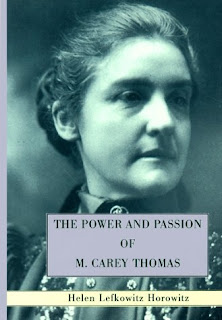Historian Helen Lefkowitz Horowitz’s biography of M. Carey Thomas, The Power and Passion of M. Carey Thomas (New York: Knopf, 1994), gives us a flesh and bones portrait of a significant figure in American and Western intellectual and particularly American higher education history. Thomas, who was amongst the first Americans who undertook their graduate education in Germany and German Switzerland, was, to use a probably overused metaphor, the mother of Bryn Mawr College, the ostensibly Quaker women’s college located in Bryn Mawr, Pennsylvania near Philadelphia. The scion of a Gurneyite Quaker family, Thomas was Bryn Mawr's second president.
Thomas was not only the president of what became one of the elite women’s colleges in the US—one of the now mythical seven sisters—but was also, as Horowitz reminds us, an important figure in the history of American education, in American higher education, in American higher education for women, in late nineteenth and early twentieth century suffrage and feminist movements, in philanthropic movements, and in the intellectual life of the era in general.
Horowitz’s biography does what all good biographies should do: It puts Thomas’s life in broader economic, political, cultural, demographic, and geographic contexts. Horowitz does a nice job of exploring Thomas’s 19th century Anglo-Saxonism with its ethnocentrism and Social Darwinism. She does a fine job of exploring Thomas’s seeking after power side. And she does an excellent job of exploring Thomas’s romantic—she was devoted to romantic artists like Dante Gabriel Rossetti and Algernon Charles Swinburne—and her romantic cultural criticism side, Thomas's passionate side, Thomas's Anne Shirley side, if you will. Horowitz also gives us a lot of information—I would call it gossip—about Thomas’s “smashes", the trials and tribulations of those “smashes", Thomas’s upstairs manor house mentality, Thomas's devotion to wealth and what it could bring, Thomas’s more Machiavellian and scheming side. This last side of Thomas, by the way, seems essential for someone embedded in higher levels of corporate bureaucracies like America's colleges and universities who has ambitions beyond being a cipher of the real powers that be, many of them businessmen (or conservative Quaker businessmen and “local leaders” in Bryn Mawr’s case for most of Thomas’s reign), in America’s educational bureaucracies who serve on the boards of directors of America's colleges and universities.
While I liked Horowitz’s contextualisations I found her polemical argument that by formulating a more egalitarian feminism that called for equal opportunities for women Thomas stood outside of her time to some extent and thus that we can condemn her, from a late 20th century vantage point, for her late 19th and early 20th century ethnocentrisms (moral presentism?), problematic. Thomas's egalitarian feminism, after all, as Horowitz notes several times in the book, was ultimately, grounded in Anglo Saxon Social Darwinism, something she took initially from Herbert Spencer, making it and her very much the product of its and her time. Nor did I find Horowitz’s attempt to argue that Thomas’s anti-Semitism was a projection of her own conscious or unconscious attitudes about herself particularly compelling. Ethnocentrisms of all varieties, in my experience, are generally tied to conceptions of usness and themness or otherness, with the other often demonised, a phenomenon that is less psychological projection and more a social and cultural construction of identity and communituy that is embodied, thanks to primary and secondary socialisation throughout one's life cycle.
As someone interested in the history of higher education and British settler society religion I enjoyed Horowitz’s biography of Thomas. She and her siblings and cousins, many of whom moved in the lofty circles of the North American and European intellectual culture of the era, represent, at least to me, someone who has had a long interest in the history of Anglo-American Quakerism and the increasing secularisation of Gurneyite Quakerism particularly on the east coast of the United States. More broadly, Horowitz’s The Power and Passion of M. Carey Thomas restores Thomas to the important position in American intellectual history and the history of American higher education she held and holds, something that should not be but far too often was forgotten.

No comments:
Post a Comment